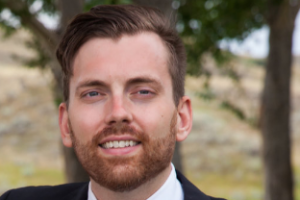
Many law students pursue exchange semesters as a way to travel before entering practice, but for Dustin Klaudt, the CBA Young Lawyers International Program (YLIP) provided a chance to continue travelling, even after being called to the bar in BC. The program, with funding from Global Affairs Canada, places young law graduates at internships with organizations working in law reform, human rights, and access to justice in various countries in Africa, East and South Asia, and the Caribbean.
“It presented an unparalleled opportunity for a young lawyer to work abroad and be immersed in a foreign legal environment and culture,” he said, adding that finding employment in human rights and constitutional law in particular is often difficult in Canada. The program gave him an opportunity to work in those areas early in his career after being placed with the Legal Resources Centre (LRC) in South Africa. He spent around 8 months in Africa altogether, returning to Canada this past September, when he began an LLM at York University’s Osgoode Hall. “[The YLIP] has acted as a platform for launching many of its alumni’s careers in the human rights sphere,” he said. “It was a bonus that the placement allowed me to explore parts of the world I had not seen.” Currently, he’s travelled to 36 countries “and counting”, including Botswana, Mozambique, Namibia, Lesotho and Zimbabwe, which he had the opportunity to visit while in Africa.
While his placement gave him another chance to explore it, Klaudt’s passion for law and justice began long before his experience in South Africa, and even before starting his JD at Allard Law.
“What solidified this interest was my high school years in rural Alberta when marriage equality became Canadian law,” he said. “I was closeted then, and witnessing the power law had to transform society in a positive way inspired me to pursue it as a profession.”
Later, during his third year at Allard Law, he coordinated student opposition efforts against Trinity Western University’s proposed law school, and described this as a “defining moment.”
“TWU’s discriminatory covenant struck a personal chord and was my first real advocacy effort. It was a catalyst for my current social justice initiatives.”
Additionally, he described some of his most memorable law school moments: mooting with his coaches, Professors Edinger and Blom, and acting as “Dean for the Day” in 2013, when he took on former Dean Bobinski’s daily routine.
Klaudt’s interest in constitutional and human rights throughout law school led to a “longstanding fascination” with South Africa. He said he was “intrigued to learn more about how their progressive Constitution helped transform South African society and liberate its people from the chains of apartheid.”
He noted numerous differences between the South African and Canadian legal systems, including that in South Africa, as in Britain, the role of attorney or solicitor is separate from the role of advocate or barrister, and that the South African Bill of Rights explicitly includes socio-economic rights not protected by the Canadian Charter, including rights to food, water, housing, healthcare, human dignity, privacy, and a healthy environment, among others.
“The Bill of Rights has led to imposing positive obligations on the South African government,” Klaudt describes, and it “applies both vertically, against the government, and horizontally, against private individuals”, which differs from Canada.
One case in particular that Klaudt was proud to be involved with is Laubscher, which dealt with whether same-sex partners in non-registered civil unions should have the same protections on the death of a partner as those in registered civil unions or opposite sex relationships. The LRC received a request for help from a client with a similar issue, and identified Laubscher as a case which was already scheduled for a hearing by the Constitutional Court.
Klaudt’s history—having practiced estate and trusts law in addition to some family law and commercial litigation in Vancouver, as well as his efforts promoting LGBTQ+ equality in Canada—placed him well to help coordinate an intervention strategy in the case. After he and his colleagues at the LRC compiled a case and retained advocates, they were able to successfully intervene in the case.
“Laubscher serves in a long line of South African jurisprudence expanding the scope of relationship and family status recognition,” he said. “It reinforced the substantive equality owed to same-sex partners and preserved vested intestacy rights for many South Africans.”
Since his placement in South Africa ended in August 2016, Klaudt has been pursuing a Master of Laws at Osgoode Hall Law School, exploring another of his passions, climate change, where he has been researching the “interplay of climate science, economic policy, and multiple different areas of law”. He has also taken on clinical work through Osgoode’s Environmental Justice and Sustainability Clinic, and is considering whether he will pursue a doctorate, return to practice, or explore some other possibility.
“Two years ago, when I was practicing big law, I doubt I ever would have imagined working in South Africa to promote human rights,” he said. “Looking back, I can unequivocally say my experience was transformative and inspiring.”
Mr. Klaudt was profiled in the March 2017 edition of the Peter A Allard School of Law Alumni e-newsletter
First published on October 26, 2019.